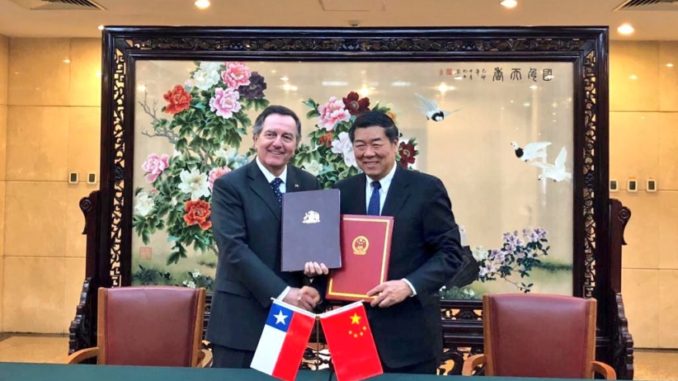
SANTIAGO/BEIJING – Chile’s foreign minister on Friday arrived at the National Development and Reform Commission of China to sign the cooperation agreement between both countries, within the framework of the Beijing’s ambitious global infrastructure project of Belt and Road.
On the part of China, the person in charge to subscribe the agreement was the President of the National Commission of Development and Reformation, He Lifeng.
After specifying the signature, Robert Ampuero declared: “By instruction of President Sebastián Piñera, we signed the memorandum of understanding between Chile and China in the framework of the Strip and Road initiative. We are happy because this initiative will allow us to enter a new stage of collaboration between both countries.”
The agreement advertises Chile as a destination for Chinese investment and make the country a “landing point for investments in Latin America,” said Roberto Ampuero.
Along with this the Chancellor added that “fundamentally it will allow us to explore many ways to cooperate and develop infrastructure for our country. And that is what we need in Chile, we are a country that has modernized a lot, that needs investments and financing in infrastructure with roads, ports, bridges, railway renewal among other things”.
The “Belt & Road” initiative is a development strategy driven by China that focuses on connectivity and cooperation, mainly between China and Eurasia, based on infrastructure, trade and investment.
The concept is inspired by the network of commercial routes established in the Han dynasty (206 BC – 220 AD), known as the Silk Road. It started in Chang’an (now Xian) in eastern China, and ended in the Mediterranean, connecting China with Europe.
China is Chile’s top trading partner, as well as that of several other countries on the continent including Brazil and Argentina. Commercial ties between the two nations have been accelerating, with a deal signed last week slashing customs controls for Chilean products shipped to China.
Latin America, traditionally under Washington’s sphere of influence, is increasingly embracing offers of cooperation from Beijing. China has already promised to invest $250 billion in the region over the next decade.



